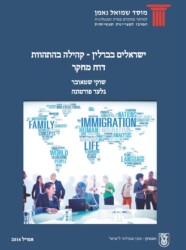In recent years, there has been a large migration movement to Europe, especially to two cities, London and Berlin.
This study looked at the motives, lifestyle, and perceptions of Israelis who emigrated to Berlin in 2015, in light of the special relationship between Israel and Germany.
Three main questions were examined:
What are the motives for the immigration of Israelis to Berlin, despite the language barrier and fears generated by the past?
How is the community life of Israelis consolidated in Berlin?
How do the Israelis in Berlin perceive their life in the capital of Germany?
The data were collected as part of a qualitative research founded on participant observation and semi-structured interviews. The principal Investigator lived in Berlin for 16 months, conducted 85 semi-structured interviews with Israelis in Berlin, with experts and key personnel, participated in 90 events, and visited relevant institutions and organizations. In addition, materials were collected from reports, magazines, and Websites.
The study identified six main reasons for emigration from Israel and found three super-frames for the formation of Israeli communities in Berlin. The findings and conclusions of the report were that this community is in the process of formation and most of the migrants are still at the stage of finding their way and that Berlin is just a springboard to permanent emigration. The conclusions were distributed in early 2016 and sent to the relevant government offices, with recommendations to formulate a National Policy regarding the attitude toward Israelis who immigrate to Berlin and toward immigrants at the beginning of the migration process. At this stage, the government has still not responded to the recommendation to formulate a new national policy relating to this community.


